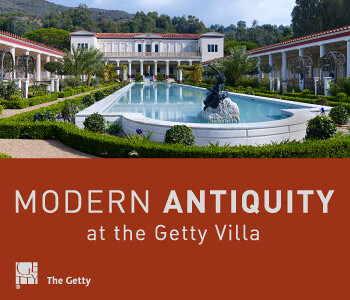A One-Day Symposium
At the J. Paul Getty Museum,
Getty Villa
Friday, November 4, 2011
10:30 a.m.–5:00 p.m.
Reception to follow
On November 4, 2011, the Getty Villa hosts a one-day symposium exploring the role “modern classicism” has played in the understanding of both modernism and the classical past. Confirmed participants include Jean-Louis Andral, Picasso Museum, Antibes; Elizabeth Cowling, University of Edinburgh; Jens Daehner, J. Paul Getty Museum, Los Angeles; Whitney Davis, University of California, Berkeley; Lisa Florman, The Ohio State University, Columbus; Christopher Green, Courtauld Institute of Art, London; Silvia Loreti, University of Manchester; Sheldon Nodelman, University of California, San Diego; and Kenneth Silver, New York University.
The symposium is presented in conjunction with the international loan exhibition Modern Antiquity: Picasso, de Chirico, Léger, and Picabia in the Presence of the Antique, on view November 2, 2011 through January 16, 2012 at the Getty Villa. The exhibition looks at how four eminent artists reinvented and transformed antiquity between 1906 and 1936. Juxtaposing ancient art with modern painting, it also draws attention to the ways in which these artists shaped our contemporary experience of antiquity.
Antiquity in the Twentieth Century: Modern Art and the Classical Vision will take place in the Getty Villa’s Auditorium. Tickets are 20.00 USD (10.00 USD students) and pre-registration is required. For a program schedule and to register on line, go to: www.getty.edu/museum/symposia/modern_antiquity_symposium.html
Registration is also available by calling (310) 440-7300.
For information on the exhibition Modern Antiquity: Picasso, de Chirico, Léger, and Picabia in the Presence of the Antique, go to:
www.getty.edu/art/exhibitions/modern_antiquity/index.html
RELATED PUBLIC LECTURE
Picasso’s Classic Realisms: Negotiating the Terms of a Relationship
Thursday November 3, 2011 at 7:30 pm
Auditorium, Getty Villa
Modern art historian Christopher Green examines Pablo Picasso’s negotiation of several overlaid relationships: between Cubism and his so-called neoclassicism, between himself as artist and his subjects, and between “classic” Picasso and “realist” Picasso. Free; a ticket is required. Tickets are available by calling (310) 440-7300 or at www.getty.edu.
MEDIA CONTACT:
Desiree Zenowich
Getty Communications
(310) 440-7304
[email protected]
The J. Paul Getty Trust is an international cultural and philanthropic institution devoted to the visual arts that includes the J. Paul Getty Museum, the Getty Research Institute, the Getty Conservation Institute, and the Getty Foundation. The J. Paul Getty Trust and Getty programs serve a varied audience from two locations: the Getty Center in Los Angeles and the Getty Villa in Malibu.
The J. Paul Getty Museum collects in seven distinct areas, including Greek and Roman antiquities, European paintings, drawings, manuscripts, sculpture and decorative arts, and photographs gathered internationally. The Museum’s mission is to make the collection meaningful and attractive to a broad audience by presenting and interpreting the works of art through educational programs, special exhibitions, publications, conservation, and research.
Visiting the Getty Center
The Getty Center is open Tuesday through Friday and Sunday from 10 a.m. to 5:30 p.m., and Saturday from 10 a.m. to 9 p.m. It is closed Monday and major holidays. Admission to the Getty Center is always free. Parking is 15 USD per car, but free after 5pm on Saturdays and for evening events throughout the week. No reservation is required for parking or general admission. Reservations are required for event seating and groups of 15 or more. Please call (310) 440-7300 (English or Spanish) for reservations and information. The TTY line for callers who are deaf or hearing impaired is (310) 440-7305. The Getty Center is at 1200 Getty Center Drive, Los Angeles, California
Additional information is available at www.getty.edu.


